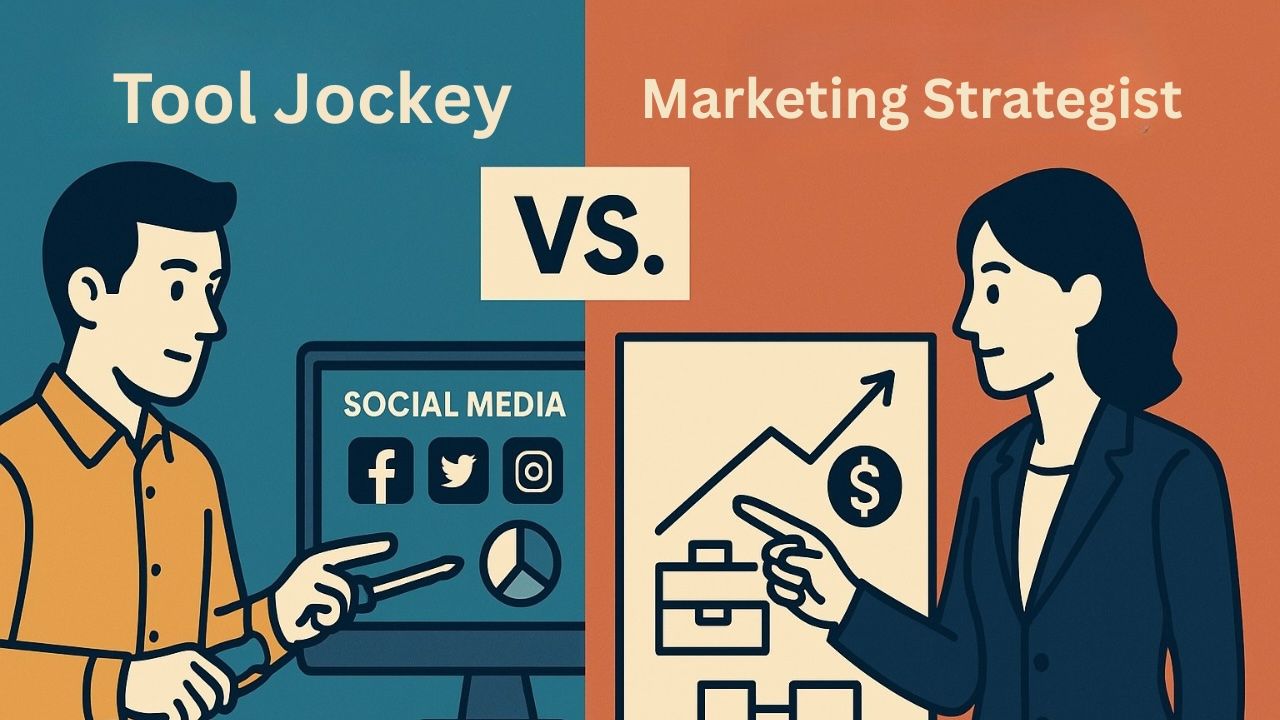Digital Marketers Are Tool Jockeys — Marketing Experts Are Strategists
Oct 17, 2025
Digital Marketers Are Tool Jockeys — Marketing Experts Are Strategists
In today’s digital world, every business owner gets bombarded with people promising results — more clicks, more followers, more leads. But here’s the truth few will tell you:
Digital marketers are tool jockeys. Marketing experts are strategists.
Digital marketers know how to push buttons — run ads, post content, track analytics, and automate emails. They’re masters of execution.
But tools don’t create growth — strategy does.
Marketing strategists start with the big picture.
They know how to align marketing with the business model, buyer psychology, and revenue goals. They dig into the “why” behind every campaign and make sure every dollar has a purpose.
The Costly Lesson of the “Wrong” Leads
A consulting firm recently hired an impressive digital marketer — someone with great credentials and a long list of tools under their belt. Within weeks, this marketer launched social media campaigns that generated thousands of leads.
It looked like a success on paper.
But when the consulting firm started calling those leads, they quickly discovered something alarming: none of them were qualified.
They weren’t decision-makers.
They weren’t in the right industry.
And most of them couldn’t afford the firm’s services.
What went wrong?
The digital marketer focused on volume, not fit.
They didn’t truly understand the company’s ideal client profile — or where those clients actually spend their time online.
The firm learned an expensive lesson:
Just because you know who your ideal customer is doesn’t mean your digital marketer understands it — or knows how to reach them.
The Takeaway
A great strategist bridges the gap between who you want and who you’re actually reaching.
Digital marketers execute campaigns.
Marketing experts craft direction.
If your marketing partner doesn’t understand your business model, your customers, and your growth goals — they’re guessing. And guesswork burns through budgets faster than any failed ad campaign.
Digital marketers manage tools. Marketing strategists build empires.
Want to avoid this mistake?
Before you hire another digital marketer, talk to a strategist who can align your marketing with your business model — not just your social feed.
You’ll wish you met me sooner.
Written by Darlene M. Ziebell
FAQs
1. What is the difference between a digital marketer and a marketing strategist?
The difference between a digital marketer and a marketing strategist is that a digital marketer focuses on executing campaigns using tools — ads, social media, and analytics — while a marketing strategist builds the overall plan. The strategist aligns marketing with the company’s business model, customer profile, and revenue goals.
2. Why did the consulting firm’s social media campaign fail even though it generated thousands of leads?
The consulting firm’s social media campaign failed because the leads weren’t qualified. The digital marketer generated volume instead of focusing on the right audience. The marketer didn’t understand the firm’s ideal client profile or where to find them, resulting in wasted time and money.
3. Can a digital marketer also be a strategist?
A digital marketer can also be a strategist, but only if they understand more than tools. Strategy requires knowing the business model, customer psychology, market position, and how each campaign ties back to revenue. Without that foundation, execution alone rarely produces real growth.
4. How can a business owner tell if their marketing partner is a strategist or just a tool jockey?
A business owner can tell if their marketing partner is a strategist or a tool jockey by listening to the questions they ask. Strategists ask about your business model, customers, pricing, and competitive edge before touching a campaign. Tool jockeys ask only for your budget and ad access.
5. Why is strategy more important than marketing tools?
Strategy is more important than marketing tools because tools are only as effective as the plan behind them. Without strategy, even the best tools waste money on the wrong audience. A solid strategy ensures every marketing dollar supports measurable business growth.
6. What lesson should business owners learn from this case study?
The lesson business owners should learn from this case study is simple: just because you know your ideal customer doesn’t mean your digital marketer does. Always make sure your marketing partner understands your goals, customer profile, and business model before they start any campaign.
Announcing The 1% Edge
If you like this blog article, check out my newsletter The 1% Edge. Designed to help business owners who want to thrive and reach their next 7 figures in business.


